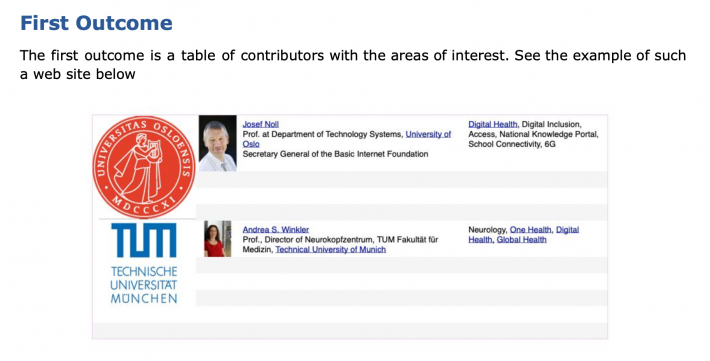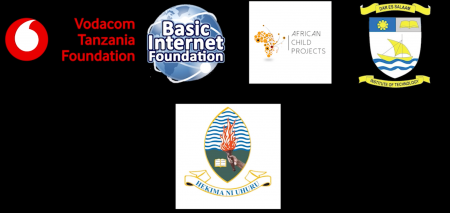Reports
| Wiki for ITS | ||||||
|---|---|---|---|---|---|---|
|
Contents
- 1 Public Reports by UiO and Basic Internet Foundation
- 1.1 Policies and Solutions for Implementing Digital Inclusion on a Global Scale
- 1.2 "Access to information on the Internet - a basic human right?
- 1.3 Impact of School Connectivity on Societal Empowerment
- 1.4 Final Report on School Connectivity in TZ - Phase II (Oct 2022)
- 1.5 Final Report School Connectivity TZ (May2021)
- 1.6 Sustainable Business Models for Connectivity and DPGs
- 1.7 Yeboo Village Portal development
- 1.8 Call for Action: University Collaboration for Digital Inclusion
Public Reports by UiO and Basic Internet Foundation
Policies and Solutions for Implementing Digital Inclusion on a Global Scale
The White paper was authored by: Josef Noll (UiO), Tale Skjølsvik (OsloMet), Hilde Opoku (NTNU), Frank Reichert (UiA), Jörn Klein (USN), Arne H. Krumsvik (Kristiania)
The purpose of this document is to suggest strategies for implementing digital inclusion in developing economies. Demanding affordable Internet access is not only part of the Sustainable Development Goals (SDGs), it was further stressed by the United Nations, Governments, the Internet Society, NGOs and local communities.
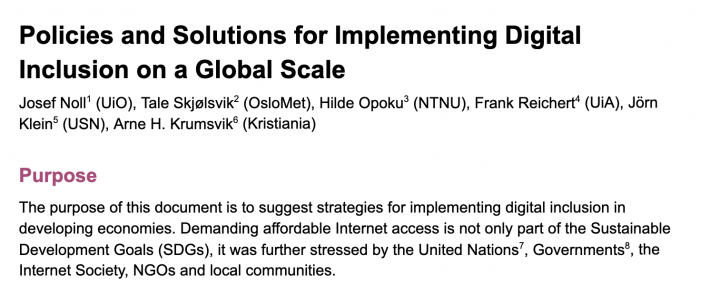
cite as: J. Noll, T. Skjølsvik, H. Opoku, F. Reichert, J. Klein, A.H. Krumsvik, "Policies and Solutions for Digital Inclusion", https://its-wiki.no/images/b/b1/Policies_Solution_DigitalInclusion.pdf, 4Nov2020
"Access to information on the Internet - a basic human right?
The concept paper was authored by Josef Noll (UiO), Catherine R. Kimambo (African Child Projects), Wisam Ahmed Mansour (Basic Internet Foundation), Sudhir Dixit (Basic Internet Foundation) and Jonathan Muringani (UiO)
The purpose of the concept note is to deepen the concept of wireless information spots for school connectivity and Community Learning & Living Labs (CL3), and to address the following questions:
- Is access to digital goods and information a universal human right?
- How can we enable access, especially for people and groups left behind by traditional business models?
- How can we provide local access to decentralised information to address global challenges and achieve the Sustainable Development Goals (SDGs)?
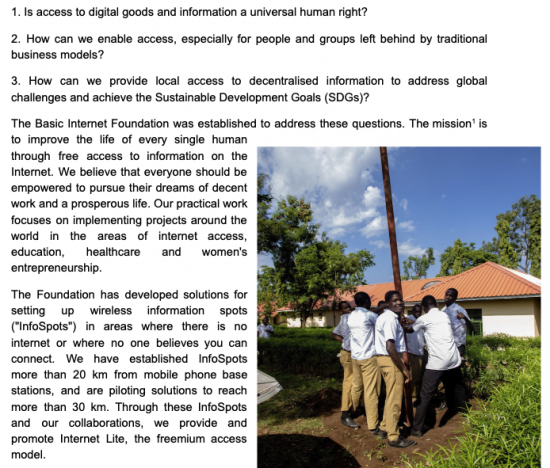
cite as: Josef Noll, Catherine R. Kimambo, Wisam Ahmed Mansour, Sudhir Dixit, and Jonathan Murinani, "Access to Information - a basic human right?", https://its-wiki.no/images/5/59/Access_to_information-a_basic_human_right.pdf, 30Jan2024
Impact of School Connectivity on Societal Empowerment
The paper was authored by Josef Noll (University of Oslo & Basic Internet Foundation), Catherine R. Kimambo (African Child Projects & Basic Internet Foundation), Peter Mmbando (Internet Society)
The purpose of this document is to describe the impact of school connectivity on societal empowerment in Tanzania. The pilot of connecting 10 schools aims at establishing sustainable business models for the operational expenditures (OPEX), and involves all actors in the value chain. Together with the Universal Communications Service Access Fund (UCSAF), Mobile Operators, UNICEF and the Internet Society, we see school connectivity as a first step for establishing access to information in local communities and thus contribute to digital inclusion. Demanding affordable Internet access is not only part of the Sustainable Development Goals(SDGs), it was further stressed by the United Nations, Governments, the Internet Society, NGOs and local communities.
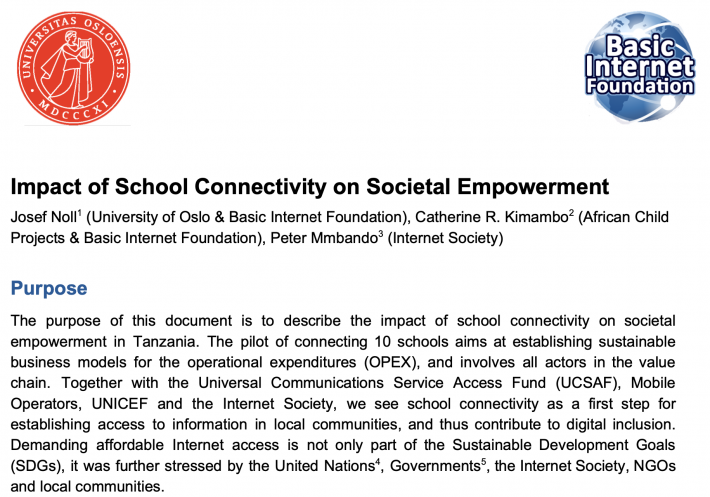
Final Report on School Connectivity in TZ - Phase II (Oct 2022)
See video File:50Schools connected TZ 2022.mp4
Final Report School Connectivity TZ (May2021)
See the video presenting the results: https://vimeo.com/560893878
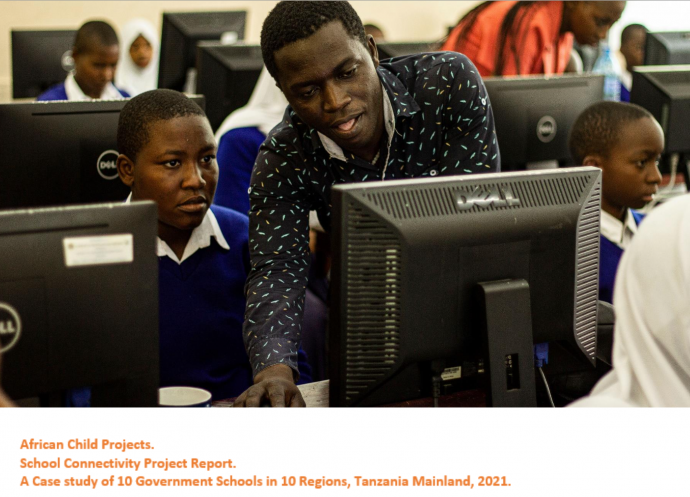
Catherine R. Kimambo from African Child established the School Connectivity pilot project (“SchoolConnect”), connected 10 government secondary schools in urban and rural Tanzania as a collaborative project involving
- Public actors including as UCSAF, MCIT, Tamisemi, and CosTech,
- Telecom operators TTCL, Vodacom and Halotel
- NGOs and SMEs including Shuledirect, African Child, and Basic Internet Foundation.
The main focus of the School Connectivity project was to demonstrate the feasibility for an OPEX of less than 20 USD/month for the connectivity. The solution for connectivity provides the Internet through the mobile network, with a reliable school server providing students with a digital education platform, as well as connection to “Internet Lite”. The success of this program, together with the experiences from school connectivity through other programs, will create the proof of concept that connectivity of schools is affordable, and at the same time demonstrate the importance of the Internet in advancing the education system in Tanzania and urge the incorporation of digital education as part of the learning curriculum to improve the quality of education in secondary schools across Tanzania.
Sustainable Business Models for Connectivity and DPGs
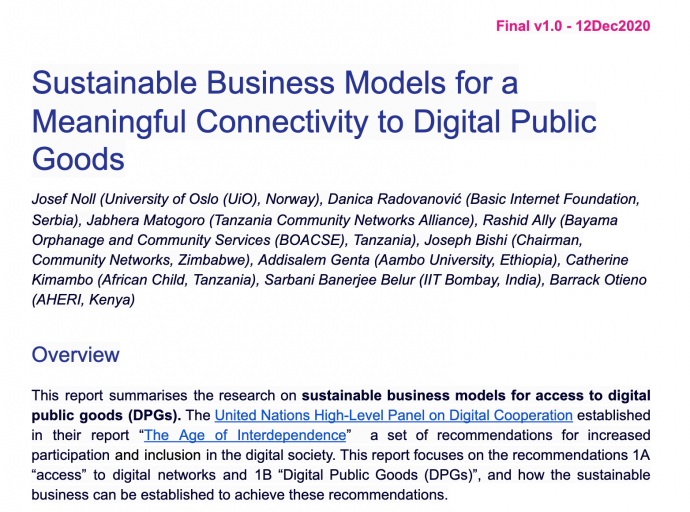
Members from 6 countries have established the report Sustainable Business Models for a Meaningful Connectivity to Digital Public Goods in Dec2020. The authors are Josef Noll (University of Oslo (UiO), Norway), Danica Radovanović (Basic Internet Foundation, Serbia), Jabhera Matogoro (Tanzania Community Networks Alliance), Rashid Ally (Bayama Orphanage and Community Services (BOACSE), Tanzania), Joseph Bishi (Chairman, Community Networks, Zimbabwe), Addisalem Genta (Aambo University, Ethiopia), Catherine Kimambo (African Child, Tanzania), Sarbani Banerjee Belur (IIT Bombay, India), Barrack Otieno (AHERI, Kenya)
Yeboo Village Portal development
Yeboo Village Portal/Platform Development - working with communities worldwide to establish a decentralised community network portal
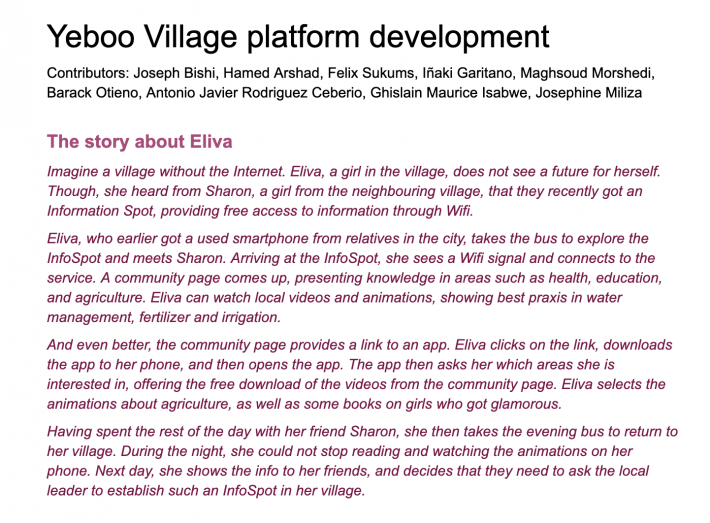
Call for Action: University Collaboration for Digital Inclusion
Establishing a worldwide University collaboration for digital inclusion, where managing trusted information and free access to this information are the core components of the collaboration. - established, see https://basicinternet.org/partners/university-collaboration-for-digital-inclusion/
